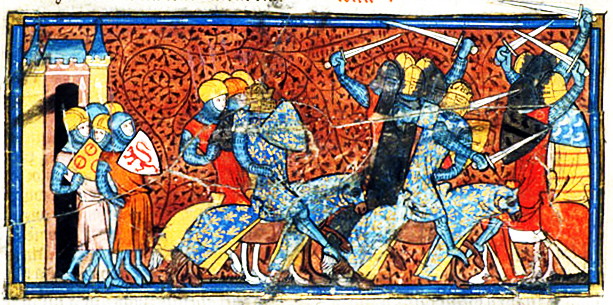If you swallowed everything the Bayeux Tapestry wanted you to believe – a duly punished perjurer, a crushed and cowed nation of sinners, in effect a wholly successful crusade; vindication moreover from the holy banner of the Pope, Alexander II, and so, by implication, the approval of God – victory for the Normans was complete, perfect, and God-given. Can’t get it much better than that. Or so the tapestry would have you believe.
Well, of course, one does not have to be a medieval scholar or enthusiast of the middle ages to spot holes in a summary as smug as that.
The Battle of Hastings was indeed one of the great decisive victories in all history, but the full conquest took just a bit longer than those few hours on a hillside seven miles from the Battle of Hastings.
The English government did indeed cave in by Christmas. They had no monarch. There was a legitimate successor waiting in the wings, but he was twelve years old – Edgar the Atheling. (‘Atheling’ meant simply ‘young prince’.) To gain the crown, he would have to fight, and lead armies. The shattered Saxon nobility, however patriotic their feelings, were not going to risk what was left of their fortunes and property by backing an untried colt who could barely lift a sword against the finest heavy cavalry in Christendom, moreover an army flushed with a gigantic victory over a country twice as big as their own. No. It was back to the wings for young Edgar. And there he went. And there he remained – for ever. A name made faint on the mural of history by forty years of futility and failure. The blood royal, with five hundred years of rule to nurture it, at last ran dry. So, yes, that was going to be permanent.
But that was only one family. There were unnumbered thousands of others. The Saxon nobility, it is true, did suffer – terribly. They had died in their legions at Fulford and Stamfordbridge and Hastings. And there was no shortage of victorious Norman adventurers to take their places. We may never know how many young, and grieving, Saxon heirs were elbowed aside as William of Normandy parcelled out most of the land to those of his vassals who had taken the great gamble. Some old English families did survive, but the fact remains that the Norman Conquest represents the greatest shift of land ownership until the sixteenth century, when the monasteries were sold off. That was drastic too.
What of the rest of Englishmen – and women – and children? Nearly one and a half million of them (insofar as we can make an intelligent guess on slender evidence). Were they all going to turn round on 15th October and say, ‘OK, William, it was a fair fight and the better side won, and let’s get on with running the country under new management, and everything will be fine’? Hardly likely.
So did William of Normandy have a nation in semi-permanent revolt for the rest of his life? No, it wasn’t like that either. Whatever colours you look for in history, you rarely find blacks and whites. Once again, you don’t have to be an expert on the middle ages to tumble to that. Life is life, in whichever century you study it.
It was a mixture. Just a few examples.
What did ordinary people think about it? I have indicated above one very likely reaction. Equally likely is the fact that we don`t know – well not for sure – because apart from some clergymen nearly all of them were illiterate. They haven’t told us. All we can do is to guess, based on whatever evidence we can glean from a scanty record, and from our knowledge of human nature, which doesn’t change much over the years.
Think for a moment. Life in the eleventh century – in any medieval century – was hard. Death was close. If you made it to forty or fifty, you were doing well. Poverty was poverty. The weather was the weather. A landlord (Saxon or Norman) was a landlord. Taxes were taxes. And so on.
And what of the victors? What did they know about the land they had conquered? They were all given estates previously owned by the Saxon casualties of the battles. Had they the faintest idea of what they were like? Even of where they were? How many of them spoke English? Had they the faintest idea of the English rules and customs of local government? Of English law? How were they going to run this country – when they still had all their estates in Normandy, which could so easily go to pot if they were away from them for too long? What did the Conquest do to a Norman baron’s family life? Unsurprisingly, the Bayeux Tapestry itself, is unconcerned with the drudgery of real life.
Just as a background to think about in spare time (spare time!), how likely was it that the kings of Norway, Denmark, and Scotland might grab any chance to raid, attack, even invade, a country which had just suffered a year of war, two invasions, and a ruling class half paralysed by casualties? They had made a habit of it in the past.
It almost makes you wonder why the Normans thought it was worth all the trouble.

Recent Comments